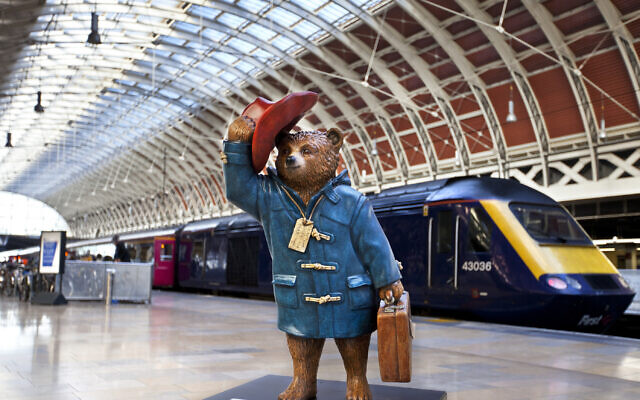The amazing Jewish backstory of Paddington Bear
Michael Bond's bestselling series was inspired by the thousands of Jewish children who escaped Nazi-occupied Europe for Britain.
With one marmalade sandwich, two Hollywood blockbusters (and a third one coming), a TV series and 70 books in 30 different languages under his hat, few icons of post-war Britain have been so enduring as the magnificent Paddington Bear.
But did you know, that one of the world’s most beloved characters has an amazing Jewish backstory?
The original Paddington Bear started out in life as an ordinary stuffed toy at the UK-based department store Selfridge’s, where children’s author Michael Bond, then a part-time writer and BBC cameraman, saw it “left on a shelf and felt sorry for him”. He took the bear home as a present for his first wife, Brenda. They named it after Paddington Station, which would inspire many of Bond’s books in the years to come. One wonders what might have been, if the teddy had been christened ‘Kings Cross’ or ‘Imperial Wharf’ Bear.
Anyway, residing on the mantelpiece in the couple’s flat, he soon became part of the family, referred to in conversations and included on holidays.
During Bond’s childhood, several stations around Britain had become the receiving points for the roughly 10,000 Jewish children who escaped Nazi-occupied Europe through the Kindertransport, travelling ahead of the Holocaust — many of whom would never see their families again. Soon, Bond created a storyline for the bear, basing Paddington’s temporary state of homelessness around his memories of seeing hundreds of these evacuees arriving at Reading station from London, each carrying their possessions in a single suitcase with labels bearing their names and addresses.
Like the children of the Kindertransport, Paddington is an emigrant labelled with a simple appeal for help. Aside from his tag that reads, “Please look after this bear. Thank you,” his suitcase is a persisting emblem of his uncertain status in a foreign land. Originally from Peru, the story goes that Paddington’s Aunt Lucy sent him by lifeboat overseas.
“Paddington, in a sense, was a refugee, and I do think that there’s no sadder sight than refugees,” Bond told the Guardian in 2014. Just as the kinders looked to the kindness of strangers to take them into their families, so does Paddington. And ultimately, he finds a loving home in the shape of the charmingly chaotic Browns, of 32 Windsor Gardens, and their housekeeper, Mrs. Bird.
The challenge of cultural assimilation has always been at the heart of the Paddington comedy. Being a stranger in a strange land, Paddington is often prone to hilarious mistakes. A few of his ideas, albeit well-intentioned, sometimes end up with Brown’s home looking like it was hit by a natural disaster. Despite being a magnet for trouble, the specific expression Paddington brings to mind is “keep calm and carry on.” He is cheerful, adaptable and hardworking, and although he frequently gets it wrong, he always “tries so hard to get things right.”
Speaking to the Telegraph in 2008, Bond said, “There is this side of Paddington the Browns don’t really understand at all, what it’s like to be a refugee, not to be in your own country.”
Yet with his polite mannerisms and simple tastes, the little Peruvian swiftly emerges as possibly more English than the English.
And then there’s Mr. Gruber. The wise and kindly antique dealer on Portobello Road, who is also Paddington’s best friend, is Jewish. With his twinkly eyes and encyclopaedic mind, it’s easy to see why Paddington enjoys Mr. Gruber’s company and visits him every day for a morning tea of buns and hot cocoa. In the first live-action film, he tells Paddington he was sent across Europe by his parents, owing to “trouble” in his home country, to London, where he arrived as a refugee.
Mr. Gruber’s real-life inspiration was Bond’s literary agent, Harvey Unna. Described in his Times obituary as “correct, buttoned-up Harvey, with his deep sense of right and wrong,” Unna was the very essence of Mr. Gruber. He was born to a middle-class Jewish family in Hamburg and became a Doctor of Jurisprudence.
Destined to become Germany’s youngest judge, Unna was dismissed in 1933 under the Nazis’ anti-Jewish race laws and fled to Britain with only a few belongings and just 25 pounds to his name. There, he would find work in the scrap metal business, making German broadcasts for the BBC, and becoming the head translator at the Nuremberg trials — all before establishing one of Britain’s most successful literary agencies. When Bond intended Paddington to come from Africa, it was Unna who gently pointed out that there are no bears there.

In recent times, Paddington has become the poster child for the benefits of immigration.
While offering a small glimpse of the human stories behind the stats (albeit through a tiny fictional bear), the franchise also provides a necessary bit of escapism.
The books are comfort-reading at their finest. Stupendously colourful and fun to read with the little ones, they are wonderful stories written with such purpose, love and confidence that they feel so fresh and true, one can’t help but bob along merrily in their current.
They are a portrait of a halcyon world that values the immigrant and welcomes the refugee, where hard work, compassion and integrity are what truly matter.
Film, book or TV show, the adventures that Michael Bond created for Paddington Bear are a rollicking ride worth returning to, again and again.
Kveller


comments